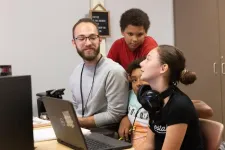(Press-News.org) A University of Texas at Dallas physicist and his international colleagues in the Dark Energy Spectroscopic Instrument (DESI) collaboration are engaged in a multiyear data-gathering mission to try to answer one of the most puzzling observations in astrophysics: Why does the expansion of the universe appear to be accelerating?
Competing theories have attempted to explain this observation. One is that dark energy is somehow pushing galaxies apart. A second theory posits that gravity, the attractive force that in local environments like the solar system draws objects together, works differently at large cosmological scales and needs to be modified to explain cosmic acceleration.
The DESI collaboration, which includes more than 900 scientists from over 70 institutions, has released a new analysis of its data that weighs in on the second theory. The data reveal that the way in which galaxies cluster is consistent with the standard model of gravity: Albert Einstein’s general theory of relativity, which also describes how objects fall under gravity and planets orbit the sun.
The analysis provides the most precise test to date of how gravity behaves at very large scales by tracing how cosmic structure grew over the past 11 billion years.
Scientists in the collaboration shared their results in several papers posted Nov. 19 to the arXiv, an online repository of scientific articles not yet peer reviewed.
Dr. Mustapha Ishak-Boushaki, a professor of physics in the School of Natural Sciences and Mathematics at UT Dallas, co-led the DESI working group that interpreted the cosmological data, and he is lead author of the paper that presents a detailed analysis of testing gravity at cosmic scales.
“For this round of DESI results, I focused my efforts at UT Dallas on conducting a large part of the analysis on gravity, which puts constraints on how matter in the universe moves and how large-scale structures, such as clusters of galaxies, evolve,” said Ishak-Boushaki, an astrophysicist whose research career has focused on questions in cosmology. “The results from DESI, combined with datasets from other experiments, are consistent with general relativity theory operating at cosmic scales, although they do not completely exclude other theories of modified gravity.”
Ishak-Boushaki is slated to present the cosmology results with other researchers on behalf of the DESI collaboration in January at a meeting of the American Astronomical Society in National Harbor, Maryland.
The new results provide an extended analysis of DESI’s first year of data, which in April contributed to the largest 3D map of the universe to date and revealed hints that dark energy might be evolving over time.
“The latest analysis is also consistent with our previous findings that give preference to the theory that dark energy is not constant, but dynamic, which is a very important result for cosmic acceleration,” Ishak-Boushaki said.
The DESI experiment can capture light from 5,000 galaxies simultaneously. The latest analysis used data from nearly 6 million galaxies and quasars, and lets researchers see up to 11 billion years into the past. With just one year of data, DESI has made the most precise overall measurement of the growth of structure in the universe, surpassing previous efforts that took decades to make.
The latest analysis also provided new upper limits on the mass of neutrinos, the only fundamental particles whose masses have not yet been measured precisely.
The new analysis broadens the scope to extract more information from the data, measuring how galaxies and matter are distributed on different scales throughout space. Like the previous study, it used a technique to hide the result from the scientists until the end, mitigating any unconscious bias.
The DESI experiment is now in its fourth of five years surveying the sky, and researchers plan to collect data from roughly 40 million galaxies and quasars by the time the project ends. The collaboration is currently analyzing the first three years of collected data and expects to present updated measurements of dark energy and the expansion history of the universe in March at a meeting of the American Physical Society.
DESI was constructed and is operated with funding from the Department of Energy (DOE) Office of Science and sits atop the National Science Foundation’s (NSF) Nicholas U. Mayall 4-meter Telescope at Kitt Peak National Observatory, which is operated by the NSF’s NOIRLab. The DOE’s Lawrence Berkeley National Laboratory manages the DESI experiment.
DESI is also supported by the National Energy Research Scientific Computing Center, a DOE Office of Science user facility. Additional support for DESI is provided by the NSF; the Science and Technology Facilities Council of the United Kingdom; the Gordon and Betty Moore Foundation; the Heising-Simons Foundation; the French Alternative Energies and Atomic Energy Commission; the National Council of Humanities, Sciences, and Technologies of Mexico; the Ministry of Science and Innovation of Spain; and by the DESI member institutions.
The DESI collaboration is honored to be permitted to conduct scientific research on I’oligam Du’ag (Kitt Peak), a mountain with particular significance to the Tohono O’odham Nation.
END
New DESI data shed light on gravity’s pull in the universe
2024-11-20
ELSE PRESS RELEASES FROM THIS DATE:
Boosting WA startups: Report calls for investment in talent, diversity and innovation
2024-11-20
A new report from the Bankwest Curtin Economics Centre reveals Western Australia’s startup and innovation ecosystem requires targeted reforms and investment to unlock its full potential, calling for improvements in talent development, gender diversity and access to capital and infrastructure to support a more diversified economy.
The report, titled ‘Dare to Venture: Startups and the innovation ecosystem in Western Australia’, highlights WA’s strengths in mining, ...
New AEM study highlights feasibility of cranial accelerometry device for prehospital detection of large-vessel occlusion stroke
2024-11-20
Des Plaines, IL – A new study exploring the use of cranial accelerometry (CA) headsets for the prehospital detection of large-vessel occlusion (LVO) strokes has been published in a recent issue of Academic Emergency Medicine (AEM), the peer-reviewed journal of the Society for Academic Emergency Medicine (SAEM).
LVO strokes, which represent one-third of acute ischemic stroke (AIS) cases in the United States, are responsible for two-thirds of poststroke dependence and 90% of poststroke mortality. The introduction of endovascular thrombectomy (EVT) over the past decade has significantly advanced the management of LVO strokes, emphasizing ...
High cardiorespiratory fitness linked to lower risk of dementia
2024-11-20
High cardiorespiratory fitness is associated with better cognitive performance and lower risk of dementia long term, including in people with a genetic predisposition to dementia, show the findings of a study published online in the British Journal of Sports Medicine.
Cardiorespiratory fitness (CRF) is the capacity of the circulatory and respiratory systems to supply oxygen to muscles and declines increasingly with age as skeletal muscle is lost. CRF declines by around 3% to 6% per decade when people are in their 20s and 30s, but this accelerates to more than 20% per decade by the time people reach their 70s. Low CRF is a strong predictor of cardiovascular ...
Oral microbiome varies with life stress and mental health symptoms in pregnant women
2024-11-20
The number and type of microbes present in the saliva of pregnant women differ according to whether they are experiencing life stress and symptoms of anxiety, depression and post-traumatic stress disorder (PTSD), finds a study published in the open access journal BMJ Mental Health.
Although several studies have shown links between the diversity of microbes in the gastrointestinal tract and stress, anxiety and depression in pregnant women and new mothers, no previous study has looked at the association between the type and number of microorganisms in the mouth and throat—oral microbiome—and ...
NFL’s Arizona Cardinals provide 12 schools with CPR resources to improve cardiac emergency outcomes
2024-11-20
PHOENIX, November 19, 2024 — The American Heart Association and the Arizona Cardinals gathered representatives from 12 local schools for cardiopulmonary resuscitation (CPR) and automated external defibrillator (AED) training on Nov. 18 at Pima Elementary School in Scottsdale. According to American Heart Association data, Nearly 9 out of 10 people who experience cardiac arrest outside of a hospital die, in part because they do not receive immediate CPR more than half of the time. CPR, especially if performed immediately, can double or triple a person’s chance of survival.
“Early ...
Northerners, Scots and Irish excel at detecting fake accents to guard against outsiders, Cambridge study suggests
2024-11-20
UNDER STRICT EMBARGO UNTIL 00:01AM (UK TIME) ON WEDNESDAY 20TH NOVEMBER 2024
People from Glasgow, Belfast, Dublin and the north-east of England are better at detecting someone imitating their accent than people from London and Essex, new research from the University of Cambridge has found.
People from Belfast proved most able to detect someone faking their accent, while people from London, Essex and Bristol were least accurate.
The study, published today in Evolutionary Human Sciences found that the ability of participants ...
Synchronized movement between robots and humans builds trust, study finds
2024-11-20
Trust between humans and robots is improved when the movement between both is harmonised, researchers have discovered.
These findings could improve the success of real-world human-robot teams, helping users like the emergency services to work more effectively with robots in the future.
By sensing co-movement in real-world environments, robots could use this as an indicator to sense whether the user trusts them sufficiently.
Lead author Dr Edmund Hunt, based in the University of Bristol’s Faculty of Science and Engineering, said: “People have preferred social distances from others during interaction and ...
Global experts make sense of the science shaping public policies worldwide in new International Science Council and Frontiers Policy Labs series
2024-11-19
In the Making Sense of Science series – launched today (20 November) by Frontiers’ Policy Labs in partnership with the International Science Council (ISC) – world leading scientists, including scientific experts and knowledge brokers from the ISC Fellowship, give insights into how science should be understood by the public and applied to policies that affect societies worldwide.
In the face of global threats – health crises, climate change, war – we need political will, global collaboration, inter- and transdisciplinary approaches, systems ...
The Wistar Institute and Cameroon researchers reveals HIV latency reversing properties in African plant
2024-11-19
A collaboration between The Wistar Institute and the University of Buea in Cameroon has uncovered the mechanisms for a medicinal plant with anti-HIV potential in Croton oligandrus Pierre & Hutch, a species of African tree that has been used in traditional healing in Cameroon to treat a variety of diseases and conditions including cancers and diabetes.
The research team — a collaboration between Fidele Ntie-Kang, Ph.D., an Associate Professor of Pharmaceutical Sciences at the University of Buea and the Director of the University of Buea Centre for Drug Discovery, and Ian Tietjen, Ph.D., Assistant Professor and Education Director of Global Studies & ...
$4.5 million Dept. of Education grant to expand mental health services through Binghamton University Community Schools
2024-11-19
BINGHAMTON, N.Y. -- The U.S. Department of Education has awarded Binghamton University Community Schools (BUCS) a five-year grant, totaling more than $4.5 million, to expand mental health services in Chenango County as part of its Mental Health Service Provider Demonstration Grant Program. This initiative, entitled Empowering Rural Communities: Promoting Mental Health, Equity, and Wellbeing Through a University-assisted Community Schools Approach, will expand social work support to students and families in the Norwich and Oxford school districts with the ability to serve 2,310 ...


